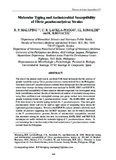Molecular typing and antimicrobial susceptibility of Vibrio parahaemolyticus strains
Share
抄録
The aim of the present study was to use three PCR-based techniques for the analysis of genetic variability among Vibrio parahaemolyticus strains isolated from the Philippines. Seventeen strains of V. parahaemolyticus isolated from shrimps and from the environments where these shrimps are being cultivated were analyzed by RAPD, ERIC and REP-PCR. Antimicrobial susceptibility of these strains to selected compounds was investigated using broth microdilution method. Results of this work and analysis of similarity among strains using Dice coefficient and unweighted average pair group method have demonstrated genetic variability within the V. parahaemolyticus strains. The RAPD, ERIC and REP-PCR were found to be suitable typing methods for V. parahaemolyticus. They have good discriminative ability and can be used as rapid means of comparing these strains for epidemiological investigation. However, the REP-PCR analysis yielded a relatively small number of products suggesting that the REP sequences may not be widely distributed in the V. parahaemolyticus genome. Results of antimicrobial susceptibility revealed that resistance among the strains was rare. In conclusion, RAPD, ERIC and REP-PCR techniques are useful methods for molecular typing of V. parahaemolyticus strains. To our knowledge this is the first study of this kind carried out on V. parahaemolyticus strains isolated from the Philippines.
Suggested Citation
Maluping, R.P., Lavilla-Pitogo, C.R., Romalde, J.L., & Krovacek, K. (2008). Molecular typing and antimicrobial susceptibility of Vibrio parahaemolyticus strains. In M.G. Bondad-Reantaso, C.V. Mohan, M. Crumlish, & R.P. Subasinghe. (Eds.). Diseases in Asian Aquaculture VI., (pp. 451-468). Manila, Philippines: Fish Health Section, Asian Fisheries Society.

